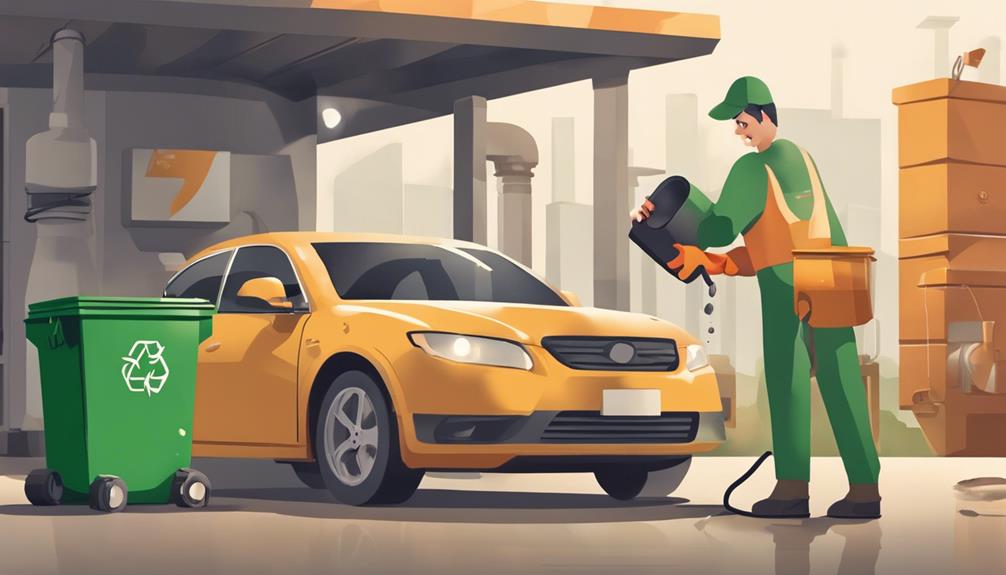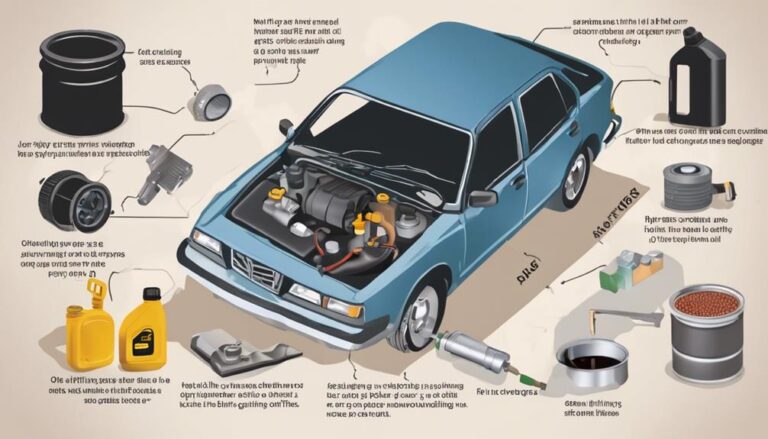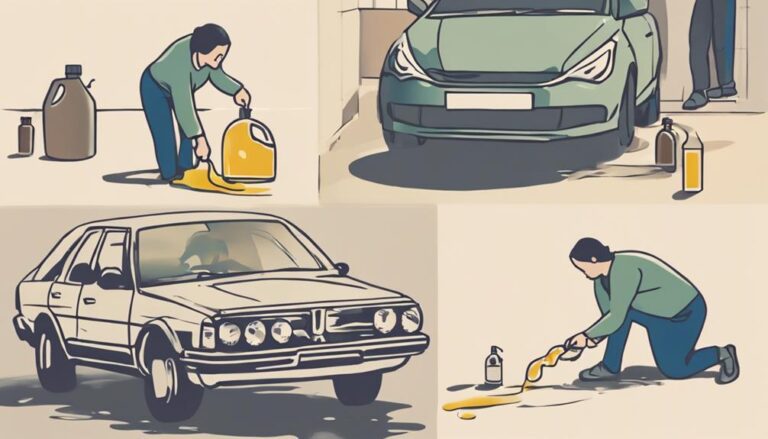5 Best Ways to Reduce Oil Change Impact
When it comes to minimizing the impact of oil changes, you're in for a smooth ride if you know the right maneuvers. With environmental consciousness on the rise, it's crucial to adapt to practices that not only benefit your vehicle but also the world around you.
So, buckle up and discover the top 5 ways that will revolutionize the way you handle oil changes. Let's explore together how a few simple adjustments can make a significant difference in the long run.
Key Takeaways
- Use high-quality synthetic oil for longer intervals and improved efficiency.
- Opt for eco-friendly oil filters to reduce landfill waste and promote sustainability.
- Embrace extended oil change intervals to save time, money, and the environment.
- Ensure proper disposal of used oil and filters to prevent contamination and support recycling efforts.
Utilize High-Quality Synthetic Oil
To maximize the efficiency and longevity of your vehicle's engine, opt for high-quality synthetic oil with superior thermal stability and resistance to breakdown over conventional oils. Synthetic oil benefits include lasting up to three times longer than conventional oils, reducing the frequency of oil changes, improving fuel efficiency, and lowering overall maintenance costs.
Despite some synthetic oil myths, such as being too expensive or causing leaks in older engines, these oils provide better protection against engine wear, ensuring optimal performance and longevity. High-quality synthetic oils offer enhanced viscosity properties, maintaining proper lubrication across a wide range of temperatures.
Opt for Eco-Friendly Oil Filters
By choosing eco-friendly oil filters, you can actively reduce your environmental impact and promote sustainable waste management practices in your vehicle maintenance routine. Opting for these filters not only benefits the environment but also supports responsible disposal methods. Here's what you need to know:
3 Key Points to Consider:
- Filter Material Options: Eco-friendly oil filters are typically crafted from sustainable materials such as cellulose, synthetic fibers, or reusable components. These materials are designed to be recycled or biodegradable, ensuring minimal environmental impact.
- Environmental Impact: Choosing eco-friendly filters helps minimize landfill waste and supports sustainable practices. By using these filters, you contribute to reducing carbon footprint and promoting eco-conscious behaviors.
- Manufacturer Programs: Some companies provide oil filter recycling programs, encouraging proper disposal and recycling of used filters. Participating in these initiatives can further enhance your contribution to environmental sustainability.
Embrace Extended Oil Change Intervals

Embracing extended oil change intervals in modern vehicles can significantly reduce maintenance frequency and overall environmental impact. With intervals ranging from 5,000 to 15,000 miles for most cars, following manufacturer recommendations is key.
Synthetic oils, known for their longevity, further extend these intervals, benefiting both your wallet and the environment. Diesel engines, with intervals of 7,000 to 10,000 miles, also contribute to reducing oil change frequency.
One common misconception is sticking to the outdated 3-month/3,000-mile rule, which often leads to unnecessary oil changes and increased environmental impact. By embracing longer intervals, you not only save time and money but also reduce the amount of oil disposed of improperly.
Proper Disposal of Used Oil and Filters
Extending the discussion from optimizing oil change intervals, one crucial aspect to address is the proper disposal of used oil and filters.
Tips for Proper Disposal of Used Oil and Filters:
- Recycling Benefits: Used oil can be recycled and re-refined, yielding high-quality lubricating oil. Recycling not only prevents contamination of soil and water sources but also reduces the need for crude oil extraction, contributing to the conservation of natural resources.
- Environmental Protection: Recycling used oil filters is also essential. The steel in each filter is valuable for manufacturing new products. By recycling both oil and filters, you actively participate in protecting the environment and promoting sustainability.
- Proper Disposal Locations: Many auto parts stores, recycling centers, and government facilities accept used oil and filters for recycling. By utilizing these disposal locations, you ensure that the used oil and filters are managed appropriately, further contributing to environmental protection.
Consider Engine Tune-Ups for Efficiency

Consider enhancing your vehicle's efficiency through regular engine tune-ups to optimize fuel consumption and reduce harmful emissions. By maximizing mileage and enhancing performance, you can experience a significant improvement in your driving experience. Regular engine tune-ups have been proven to improve fuel efficiency by up to 4%, allowing you to get more out of every gallon of gas. Additionally, a properly tuned engine can reduce harmful emissions by up to 30%, contributing to a cleaner environment. Engine tune-ups also play a crucial role in preventing issues such as misfiring, stalling, and rough idling, ensuring your vehicle operates smoothly.
Furthermore, maintaining optimal engine performance through tune-ups can extend the life of your vehicle, saving you money on potential costly repairs in the long run. Tuning up your engine not only enhances overall driving performance and responsiveness but also ensures that your vehicle operates at its best capacity. Invest in regular engine tune-ups to reap the benefits of improved efficiency, performance, and longevity.
Frequently Asked Questions
How Do I Not Make a Mess When Changing Oil?
To avoid making a mess when changing oil, place a large drain pan, wear disposable gloves, and cover the floor with cardboard. Use a plastic bag for the oil filter, a second pan for recycling, and a funnel for clean pours.
How Do I Not Get Taken Advantage of an Oil Change?
To avoid getting taken advantage of during an oil change, research your vehicle's needs, request transparency in services, and compare prices. By being informed and assertive, you can ensure proper preventative maintenance and protect your consumer rights.
How Can I Save Money on an Oil Change?
To save money on oil changes, you can DIY maintenance and utilize oil change coupons. By performing your oil changes and taking advantage of discounts, you can reduce costs and have more control over your vehicle maintenance.
Can You Go 10000 Miles With Synthetic Oil?
With synthetic oil, you can stretch the interval to 10,000 miles, thanks to its durability and engine protection. Regular analysis can help determine when to change, allowing for longer periods between oil changes.
Conclusion
In conclusion, by implementing these 5 best ways to reduce oil change impact, you can significantly improve the efficiency and environmental friendliness of your vehicle maintenance routine.
Imagine a world where each oil change not only benefits your car but also minimizes the impact on the environment. With the right tools, products, and practices, you can make this vision a reality.
So why wait? Start making a positive change today.







